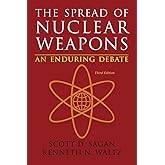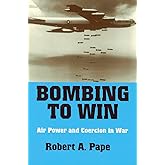
Download the free Kindle app and start reading Kindle books instantly on your smartphone, tablet, or computer - no Kindle device required.
Read instantly on your browser with Kindle for Web.
Using your mobile phone camera - scan the code below and download the Kindle app.

Follow the author
OK
The Spread of Nuclear Weapons: A Debate Renewed Paperback – August 28, 2002
In The Spread of Nuclear Weapons: A Debate Renewed, professors Waltz and Sagan resume their well-known dialogue concerning nuclear proliferation and the threat of nuclear war.
Kenneth Waltz, Dean of Realist Theory in international relations at Columbia University, expands on his argument that "more may be better," contending that new nuclear states will use their acquired nuclear capabilities to deter threats and preserve peace. Scott Sagan, the leading proponent of organizational theories in international politics, continues to make the counterpoint that "more will be worse": novice nuclear states lack adequate organizational controls over their new weapons, resulting in a higher risk of either deliberate of accidental nuclear war. Treating issues from the ’long peace’ between the United States and Soviet Union made possible by the nuclear balance of the Cold War to more modern topics such as global terrorism, missile defense, and the Indian-Pakistani conflict, The Spread of Nuclear Weapons: A Debate Renewed is an invaluable addition to any international relations course.- Print length240 pages
- LanguageEnglish
- PublisherW. W. Norton & Company
- Publication dateAugust 28, 2002
- Dimensions5.5 x 0.6 x 8.3 inches
- ISBN-100393977471
- ISBN-13978-0393977479
There is a newer edition of this item:
Book recommendations, author interviews, editors' picks, and more. Read it now.
Customers who viewed this item also viewed
Editorial Reviews
About the Author
Kenneth N. Waltz is Emeritus Ford Professor of Political Science at the University of California at Berkeley and senior research associate at Columbia University’s Saltzman Institute of War and Peace Studies. His books include Man, the State, and War: A Theoretical Analysis and Theory of International Politics.
Product details
- Publisher : W. W. Norton & Company; Second edition (August 28, 2002)
- Language : English
- Paperback : 240 pages
- ISBN-10 : 0393977471
- ISBN-13 : 978-0393977479
- Item Weight : 7.2 ounces
- Dimensions : 5.5 x 0.6 x 8.3 inches
- Best Sellers Rank: #1,663,344 in Books (See Top 100 in Books)
- #324 in Arms Control (Books)
- #9,589 in Political Science (Books)
- #59,056 in United States History (Books)
- Customer Reviews:
About the author

Discover more of the author’s books, see similar authors, read book recommendations and more.
Customer reviews
- 5 star4 star3 star2 star1 star5 star44%39%0%17%0%44%
- 5 star4 star3 star2 star1 star4 star44%39%0%17%0%39%
- 5 star4 star3 star2 star1 star3 star44%39%0%17%0%0%
- 5 star4 star3 star2 star1 star2 star44%39%0%17%0%17%
- 5 star4 star3 star2 star1 star1 star44%39%0%17%0%0%
Customer Reviews, including Product Star Ratings help customers to learn more about the product and decide whether it is the right product for them.
To calculate the overall star rating and percentage breakdown by star, we don’t use a simple average. Instead, our system considers things like how recent a review is and if the reviewer bought the item on Amazon. It also analyzed reviews to verify trustworthiness.
Learn more how customers reviews work on AmazonTop reviews from the United States
There was a problem filtering reviews. Please reload the page.
- Reviewed in the United States on March 12, 2014If you want to know anything about the arguments surrounding nuclear proliferation, this book is the foundation. Both authors are leading scholars in the field with very different views on nuclear proliferation, giving the reader the choice to choose which side of the debate they fall on or to create their own combination of the two views.
- Reviewed in the United States on March 11, 2014Sagan and Waltz did this great little dance 4 times I think. And whichever side of the argument you fall on, one thing that's important to understand is that the Obama administration, through Drs. Walt and Mearsheimer, who are Waltz' students, actually does believe in Waltz' assertion that non proliferation is a bad and unstable situation for the world we live in. They are fans of a world where nations and near-nations should have atomic weapons, generally. Just something to keep in mind.
- Reviewed in the United States on December 12, 2012If you are interested in international relations/security, this is a classic. It is short and understandable. If you read this book closely and take the time to consider its application, you will find yourself frustrated at the crap the talking heads on TV come up with when talking about war and politics.
- Reviewed in the United States on October 17, 2007Book was in good condition. As for content, it was for a course, so what does it matter?
- Reviewed in the United States on February 16, 2003This books puts together two colliding authors on whether the proliferation of nuclear weapons is a good idea or not. Waltz, one fo the premier figures of realpolitik, argues (brilliantly, even though I disagree with him) that proliferation is a good idea. Sagan argues there are too many organizational risks in the proliferation system.
The two present their arguments, and then respond to each other's argument. It is a fascinating argument, one that can be discussed in 1000 pages, but the authors do a tremendous job of synthesizing it and pointing out the major strenghts and weaknesses of each other's argument. In today's world, where we are willing to go to war to prevent proliferation, it is useful to take a step back and really understand what the main problems arising by proliferation are.
- Reviewed in the United States on January 11, 2007Certainly the best debate ever produced about the existence of nuclear weapons and its distribution around the world. Highly recomended!
Top reviews from other countries
-
 M. BuxReviewed in Germany on September 19, 2009
M. BuxReviewed in Germany on September 19, 20094.0 out of 5 stars Sehr interessant
dieses Buch war Basis für eine Seminarsarbeit meines Politikstudiums. Die Positionen der Beiden Autoren werden ausgezeichnet illustriert.










